21 Jamaican Herbs: Their Botanical Names And Uses
Valuable Jamaican herbs used as herbal remedies often grow naturally along roadsides, in pastures, and in wooded areas on the island. The situation is similar on other Caribbean islands.
Natives often take local herbs for granted or view them as a nuisance to farmers and other plants.
However, recent studies confirm that some common Jamaican herbs and plants across the Carribean possess valuable medicinal properties.
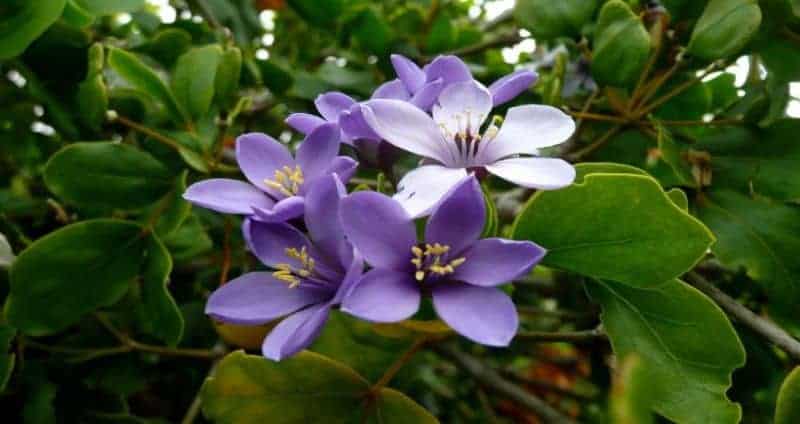
In this post we will take a note of twenty one of these Jamaican herbs, that are used as Jamaican remedies. We will help you identify them by their botanical names or other names you may know them by.
Disclosure: This article may contain affiliate links. It means if you click a link and purchase a product, I may receive a small commission at no extra cost to you. Thank you!
Popular Jamaican Tea Bush
Although the majority of these plants are used to make Jamaican teas, others are used in different ways.
Jamaican Black Mint (Mentha Spicata)
This is one of the most poplar Jamaican herbs. Jamaican Black mint is a subcategory of spearmint. It is sometimes called black peppermint.
This Jamaican herb is a perennial plant that is easy to grow in fact it can become quite invasive. Jamaican black mint likes moist, well drained soil.
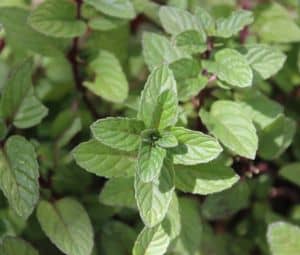
Black peppermint has dark green leaves, and purple veins and stems and reaches between 12 to 18 inches tall.
Uses: Black mint tea is used to treat indigestion, congestion, gas and bloating. Because of its strong minty aroma, black peppemint is also used to mask odors and freshen things up.
Pennyroyal (Mentha pulegium)
When crushed this herb gives off a strong minty aroma that’s similar to spearmint. Pennyroyal is also known as squaw mint, mosquito plant and pudding grass.
Uses: (Medicinal) In Jamaica Penny royal bush tea is made by boiling the leaves of the herb to relieve coughs, congestions, indigestion, menstrual cramps, and treat the flu.
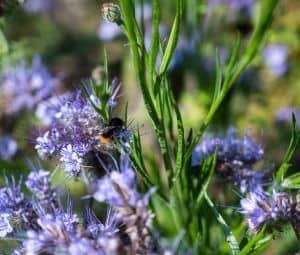
(Culinary) Pennyroyal has been found in many recipes dating back to Medieval times. However it is not used so much in cooking these days.
Caution should be exercised with the herb as ingesting too much Pennyroyal can be harmful.
Jamaican Herbs: Roots and Vines
In addition to herbs, sea moss, and the roots, leaves and vines of some plants are used to make Jamaican herbal teas.
Jamaican Cerasee (Momordica Charantia)
What is Jamaican Cerasee? It is the tropical perennial vine that produces the bitter melon fruit. The plant’s scientific name is Momordica Charantia.
Jamaican Searcy vine grows wild in Jamaica where it is used for tea. In fact, cerasee tea is one of the most common herbal remedies on the island.
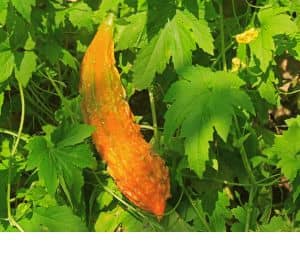
Uses: Some cerasee tea benefits and uses include diabetes management, blood detoxification, blood pressure control and skin infection treatment. A sersi tea regimen is also used to help weightloss.
Although cerasee fruit – known as bitter melon or bitter gourd – is popular in Asian and other cuisines, it is not widely consumed in Jamaica.
Jamaican Sarsaparilla (Smilax ornata)
This Jamaican herb is a trailing vine that is native to Mexico and South America. Now it grows wild in the wooded areas of Jamaica.
Other common names for the vine are sarsaparilla, Honduran sarsaparilla, and Zarzaparilla (Spanish).
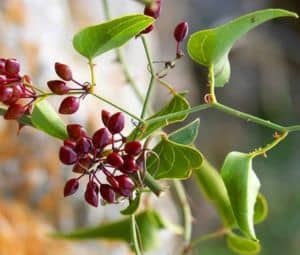
Uses: Sarsaparilla vine is cleaned, dried and cut into short pieces. The pieces are soaked for hours and used to make bush tea in Jamaica.
The herbal tea is used as a blood cleanser, tonic, and to induce sweating. Jamaican Sarsaparilla can be purchased in powder form in several online marketplaces in easy to use powdered formula.
Chaney Root (Smilax Balbisiana)
Chaney root is endemic to Jamaica and is mainly found in the wilds of the Cockpit Country. Some other names for Chaney root are chaney winder and chaney vine.
Chaney root look a lot like Jamaican sarsarparilla but they are not the same plant. However, Jamaican sarsaparilla and Jamaican chaney root are both members of the species.
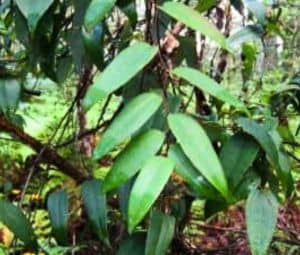
Uses: The dried root of the Smilax Balbisiana is chopped into small pieces and boiled for up to 4 hours to make tea. The tea is sweetened with sugar or honey and taken to alleviate back pain, build strength and increase stamina. It is used aphrodisiac as well.
Turmeric-Yellow Ginger (Curcuma longa)
Although it is native to the Indian subcontinent and Southeast Asia, turmeric is one popular Jamaican herb.
The bright yellow chemical curcumin, found in turmeric, is approved by World Health Org, The Food and Drug Administration in the United States and the European Parliament as a food additive.
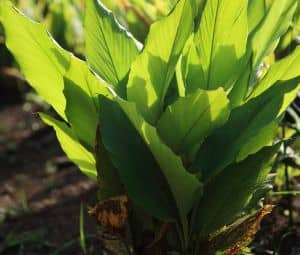
Uses. (Medicinal) Yellow Ginger is used to relieve digestive problems, reduce inflammation, relieve joint pain and swelling, and improve circulation.
(Culinary) Turmeric Powder is used to add color to sauces, curries, and seasoned rice and baked products such as Jamaican Beef Patties.

Jamaican Shrubs and Trees For Teas
Shrubs and sections of trees are also used to make Jamaican bush teas. Here are a few of the more widely used one.
Jamaican Dandelion (Senna occidentalis)
The Jamaican dandelion plant that is considered an extremely invasive nuisance. In some places Senna occidentalis is also called senna coffee, negro coffee, Magdad coffee, and coffee weed.
This Jamaican herbal plant blooms bight yellow flowers all year long. The pods which are sickle-shaped contain between 25 to 35 dark brown seeds in a single row.
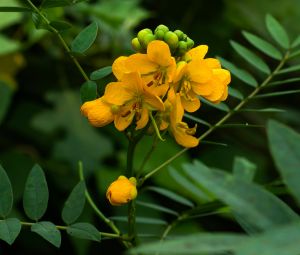
Uses: Jamaican dandelion seeds are roasted, ground and brewed to make a tea to serve as a coffee substitute. This Jamaican herb is also used to treat gout, diabetes, hemorrhoids and as a laxative.
Despite the associated coffee names, Jamaican dandelion plant does not contain any caffeine.
Jamaican Peppermint (Satureja viminea)
Jamaican Peppermint bush is is also known as Costa Rican mint and peppermint tree. Satureja viminea is a rare plant with a strong minty aroma although the plant is not a true mint.
The shrub grows 6 -12 inches high, this Jamaican mint bush can be groomed into a small 6 feet tall tree.
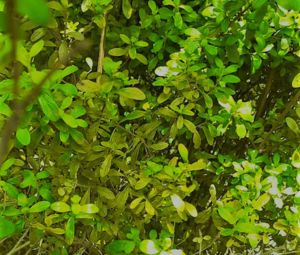
Uses: Jamaica herbal peppermint tea is used to alleviate gas and bloating, diarrhea, vomiting, nausea and headaches. The dried leaves are sprinkled on meats and poultry to give them a minty flavor.
Soursop (Annona muricata)
The Soursop is a native of Mexico, the Caribbean and South America. Depending on your location you may know this as Graviola, Guanabana, or Guyabano.
This is one of the Jamaican herbs that is not really considered a herb. It is really more adored for the delicious juice soursop made from the fruit.
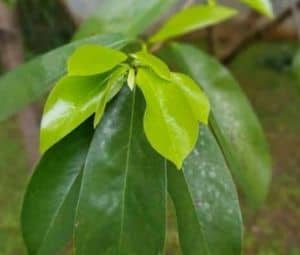
Soursop is a green prickly fruit which is eaten raw or used to make a creamy reshreshing fruit juice. The leaves are also used to make a Jamaican herb tea.
Uses: There are many claims that Soursop can be used for cancer treatment, but there is no real scientific data to back this up. However soursop tea has long been one of the popular Jamaican herbal remedies for diabetes treament, to promote sleep, and to relieve nervous tension.
Ground Graviola leaves are also used as a herbal remedy for treatment for head lice and bedbugs.
Fever Grass (cympobopon)
Lemongrass is the same thing as Fever grass. It is a fast growing tropical grass with long silky blades. Fever grass is known by names such as barb wire grass, silky heads and citronella grass.
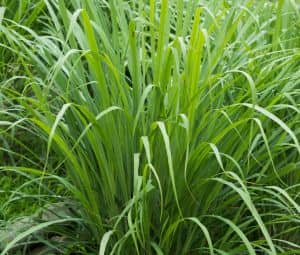
Uses: (culinary) Used in Asian cooking especially for the grass strong citrus flavor, Lemongrass is a common ingredient in stews, soups and curries.
(medicinal) Fever grass is one of those Jamaican herbs with a long history. Fever grass tea is used as herbal remedy in Jamaica for relieving symptons of the common cold, and treating fevers.
Morengay (Moringa Oleifera)
Jamaican Moringa ( pronounced Meh-ren-gay) on the island is an African native herb. But it was introduced to Jamaica as early as the 1800s.
Moringa has long been viewed as a “nuisance “pest” in Jamaica. But lately Moringa has become one of the most popular Jamaican herbs due to potential benefits identified in recent studies.
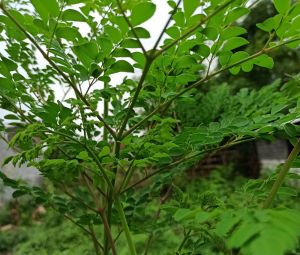
Uses: Moringa tea is used as one of the Jamaican herbal remedies to boost energy, improve vision, reduce blood glucose levels, lower cholesterol, aid in weight loss.
One of many benefits of Moringa is the leaves can be eaten raw or steamed and consumed as a vegetable.
Jamaican Bissy Kola nut (Cola acuminata)
Bissy is the fruit of the Cola acuminata plant that is commonly called kola nut. The tree which is native to the African rainforest can be found in other tropical regions.Bissy trees can grow up to 65 feet tall.
Bissy tea made by grating kola nuts and it is one of the most popular herbal remeidies on the island.
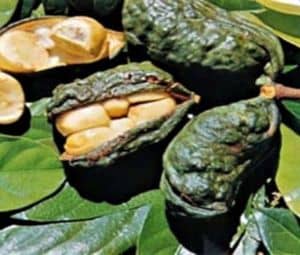
Uses. Jamaican bissy tea has the reputation af being an antedote for food poisoning and allergic reactions. It it also believed that Bissy tea is a remedy for removing traces of toxins from urine.
The one proven benefit of bissy tea that its highly caffeinated so it can keep you awake and cure caffeine cravings.
Jamaican Herbal Leaves and Weeds
Common weeds and leaves from trees all play a role in the Jamaican love affair with bush teas. These are some of the leaves and weeds used to make Jamaican teas.
Comfrey (Symphytum officianale)
Comfrey is a perennial herb that has been used in herbal medicine since the middle ages. In fact some references to the herb date back as far as 50 AD.
Comfrey has long dark green leaves and blooms bell-shaped flowers that vary from white to purple in color.
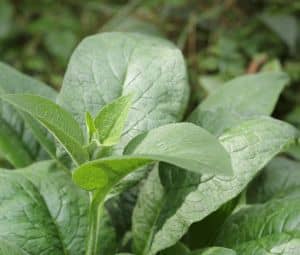
Uses: In Jamaica, Comfrey leaf tea is used to treat ulcers, diarrhea, and respiratory issues. It is also used as a gargle for sore throats as well.
However, some studies found that one chemical compound in comfrey is linked to risk of developing cancer. Therefore, the herb is not available for sale in some countries.
Semi Contra Epazote herb (Dysphania ambrosioides)
The herb is proven to be effective in removing parasites from the human body. Many of us have not so fund memories of Semo conta.
That’s because it was one of the most widely used Jamaican herbs give to children as worm medicine.
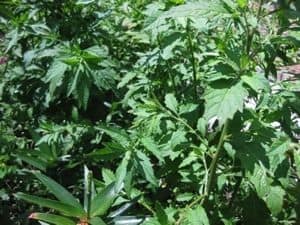
This herb is also known as Mexican tea. It has origins in Mexico and Central and South America. More recently tea made from the Semi Contra herb is sold under the name Tea of Life.
Uses. (Culinary) Epazote herb has antiflatulent properties so it is useful in alleviating digestive issues. There the herb is utilized as a seasoning in Mexican foods like chilis, tamales, quesadillas and other Mexican dishes.
(Medicinal) Semi Contra is not considered the regular Jamaican herb for making bush tea. Therefore Semi contra herb tea is mainly used in Jamaica as worm medicine to expel parasites.
I still recoil at the memory of having to gulp down semi conta tea or jucice at the end of each summer, before returning to school.
Pepper Elder (Peperomia pellucida)
This Jamaican herb for making bush tea grows between 6 and 18 inches tall. The leaves are dark green heart shaped leaves. Other local names for the plant are shiny bush plant and man to man.
The plant likes damp, shaded areas. Depending on where you live on the island you will either know this herb as Pepper Elder, Jointer or Black Joint.
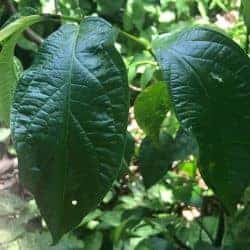
Uses: Jamaicans use “Black joint” by boiling boiling the leaves and stems for about 15 minutes to make tea for reating indigestion and abdominal pain.
In addition they are sometimes put in a container with alcohol and allowed to ferment. The concoction is used as a rub to relieve joint pain.
Wild Plantain (Plantago Major)
This is one of those lesser known Jamaican bush tea herbs. The weed grows in lawns and on many Jamaican roadsides.
Wild Plantain is not one of those herbs that an average Jamaican would associate with medicinal uses because of where it grows. However Plantain (not to be confused with the fruit) has been used as medicine since my grandmother’s generation.
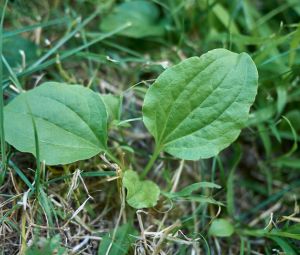
Uses: Plantago is used in a different ways. The leaves are pounded into a paste and used as a poultice for wound, sores and insect bites.
However, the roots can also be used to make a tea for the treatment of fevers and respiratory ailments.
Chickweed (Stellaria media)
Chickweed is an edible weed and that makes is a somewhat popular Jamaican herb. However, It is not as widely used as some of the others.
Chicken weed grows in lawns, grasslands, meadows and other open spaces across the globe. This weed is sometimes called winter weed, chickenwort and chicken weed.
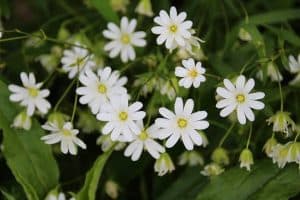
Uses. Stellaria media is consumed as a leaf vegetable in salads or in soups. Chicken weed tea is used to treat arthritis, bronchitis, menstrual cramps and upset stomachs.
In some cultures the stems are steamed in hot water and applied to soothe bruises and itchy skin.
Search Mi Heart (Rhytidophyllum Tomentosum)
This species of Rhytidophyllum is native Jamaican herb and is considered a “national treasure.” The Search mi heart plant was registered in the plant database as far back as the 1800s.
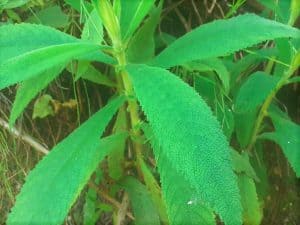
Search mi heart likes to grow in dark, damp areas in crevices and similar places.
Common Uses. Search mi heart herbal tea is used for treating asthma, bronchitis, congestion, colds, and menstrual cramps.
Leaf of life (Kalanchoe pinnata)
Known also as the miracle leaf, cathedral bells and Goethe plant is a native of Madagascar. However, Leaf of life can be found in many tropical and subtropical areas.
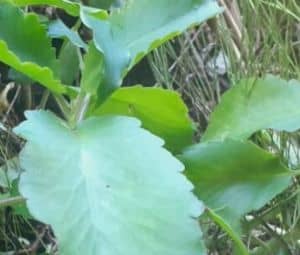
Common Uses: Leaf of life Jamaican herb is used to treat headaches, hypertension and kidney stones.
Traditionally, Leaf of life in Jamaica is used to treat respiratory illnesses such as asthma, bronchitis as well as coughs and colds.
Leaf of life tea is made by boiling the leaves for a few minutes.
Additionally the way my grandmother extracted the juice was by wrapping the fresh leaves in cheesecloth, and pounding them.
She would squeeze the juice out sweeten it with lots of homey that tasted like a syrup soothe our coughs.
Vervine (Stachytarpheta jamaicensis)
This plant is known as Vervine bush in Jamaica or Jamaican blue vervain. Vervine bush is a member of the verbena palnt family and is native to the Caribbean.
Vervine bush is among the oldest Jamaican herbal remedies. Records show vervine being used as a Jamaican medicinal herb as far back as the 1800s. These compounds are proven to have antimicrobial and other useful health properties.
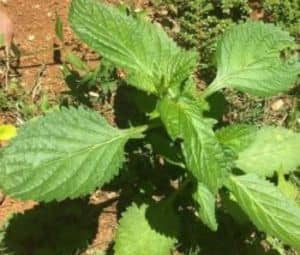
Uses. Vervine leaves have been used to make vervine tea that is believed to cleanse the blood, to lower blood pressure. Vervine herbal tea that’s used to ease anxiety and help with insomnia as well.
Jamaican blue vervain also goes by the names Brazillian tea, bastard vervain, blue shake weed and blueporter weed.
Conclusion
Those are are few of the most popular and useful Jamaican herbal remedies and their uses. Most of thes herbs from Jamaica are available for purchase on Amazon.
If I missed any herbal remedies in Jamaica that you like, please tell me about it by leaving a comment below.
Aslo if you forund this article helpful feel free to share with someone who can also find it useful.
The Lignum Vitae was chosen in the 1800s for it medicinal potential. The plant was one of the first to be studied as a potential cure for syphilis.

Shalom. Thank you.
HalleluYah.
Abba ( Father) YAH , has given us the herbs of the field to heal our bodies which is His Temple.
Many Blessings to you. Maxine Moseley.
Thanks. Glad you liked it.